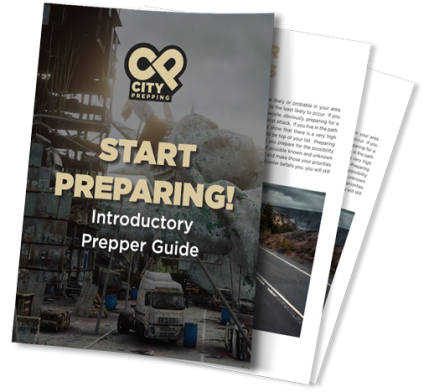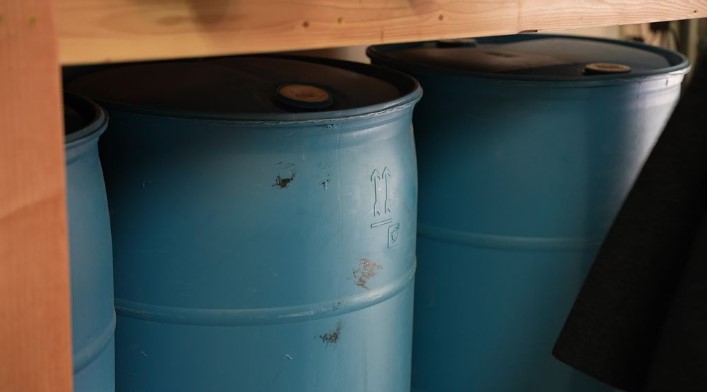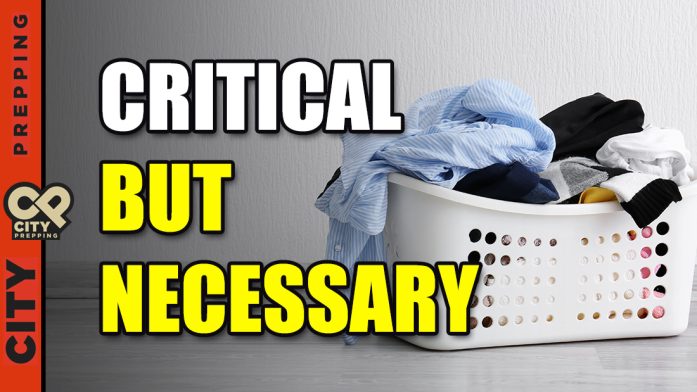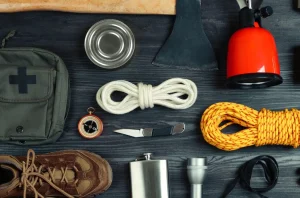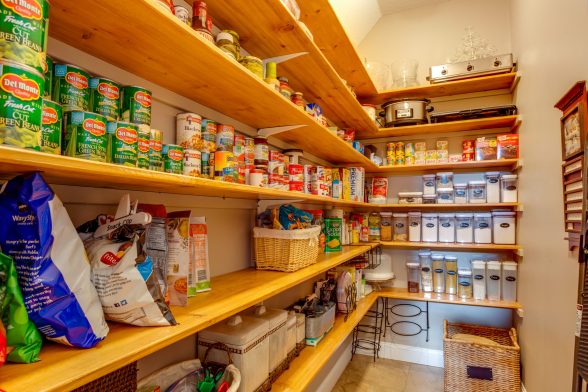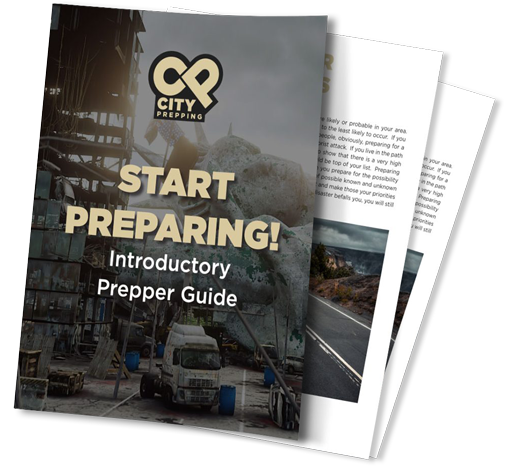 Most apartments are built with just one or two sides with windows, one entry door, one or more shared walls, a shared floor, and a ceiling that is someone else’s floor. If you are on the ground floor, these are more difficult to secure and defend, but you have an instant defense against any conflict in the streets if you are even one floor up. Your height advantage is easier to defend by firing down or throwing things at people. You are hidden and out of reach for most looters or robbers even without these more extreme measures. Your concealment is a great advantage, as any adversary doesn’t know how many people may be in the apartment or what they may be armed with. You can increase your security by duct taping Xs on windows to prevent their shattering, barricading the door, and covering the peephole. Keep curtains or shades drawn. In the immediate moments after a disaster strikes, secure all windows and doors. If you do live on the ground floor, make sure you have installed extra door and window locks.
Barricade your door. You might feel that it is safe, but when you are in an apartment, someone has a master key to your door. If that manager gets robbed, a criminal could literally go door-to-door throughout your building. You want to make sure you have more than just a flimsy chain lock on your door. Place a doorstop under your door, prop a chair under the handle, or do both. Make sure that your door only opens when you want it to.
Set up your operations toward the center of your apartment or as far from windows, doors, shared and exterior walls as possible. The exterior wall and some of the interior walls will be load-bearing, so they will be thicker. Depending on where you live, you will at least have 2X4s, insulation, maybe fire-resistant layers, brick, or cinder blocks. While these are not impenetrable, it requires someone’s commitment to hammering away at it to get through. Since it is an apartment building, there is a higher concentration of people who may not sit idly by while someone hammers away at a wall, but there are undoubtedly easier targets that don’t require much labor. It is not likely someone will waste ammo firing blindly into your walls, as you might see in an action movie, but the walls are susceptible to being penetrated by stray bullets.
If you have a patio, you have an advantage in growing some of your food to supplement your supplies. You also have a huge disadvantage in that eight-foot piece of glass as the only barrier between you and the chaos outside. A sliding patio door is part door and part window. You should keep it as secure as possible by placing a cut dowel in the runner tracks, making crisscross Xs that interconnect across the entire glass and to the frame, and keeping curtains or blinds drawn. If you have enough duct tape in your prepping supplies, you can completely cover the window and overlap onto the frame in a weave pattern of alternating horizontal and vertical tape. You can leave a few spaces to look through still. If the possibility of it breaking is high, consider moving your mattress from your bed to cover the window. You can also easily store in your prepping supplies plastic sheets and tarps. These can be affixed to the interior wall to cover windows. They can be cut to seal off vents and other airways if you are bugging in because of biochemical or radiological threats outside.
When you tape up your windows, realize that you are also signaling your presence in the apartment. Depending on the calamity you are in, that can be fine or a problem. You still hold somewhat of an advantage over other neighbors in that you are signaling you are better prepared than your neighbors and, therefore, more likely to be able to defend yourself. The element of concealment and the limited access points provide you with a more easily defensible and secure position than a house. Finally, your floor that may be someone else’s ceiling and your ceiling that may be someone else’s floor are much thicker barriers than your walls. They are not impenetrable, especially by stray bullets, but they aren’t likely to be access points into your apartment. You can often hear neighbors through walls or walking on their floor, which is your ceiling. They can hear you too. Be mindful of this and keep the volume of electrical devices whisper quiet to not advertise your energy resources. Also, speak in soft, even whisper tones. You want to hear your neighbors, but you do not want to be heard.
FOCUSING ON PREPS
Most apartments are built with just one or two sides with windows, one entry door, one or more shared walls, a shared floor, and a ceiling that is someone else’s floor. If you are on the ground floor, these are more difficult to secure and defend, but you have an instant defense against any conflict in the streets if you are even one floor up. Your height advantage is easier to defend by firing down or throwing things at people. You are hidden and out of reach for most looters or robbers even without these more extreme measures. Your concealment is a great advantage, as any adversary doesn’t know how many people may be in the apartment or what they may be armed with. You can increase your security by duct taping Xs on windows to prevent their shattering, barricading the door, and covering the peephole. Keep curtains or shades drawn. In the immediate moments after a disaster strikes, secure all windows and doors. If you do live on the ground floor, make sure you have installed extra door and window locks.
Barricade your door. You might feel that it is safe, but when you are in an apartment, someone has a master key to your door. If that manager gets robbed, a criminal could literally go door-to-door throughout your building. You want to make sure you have more than just a flimsy chain lock on your door. Place a doorstop under your door, prop a chair under the handle, or do both. Make sure that your door only opens when you want it to.
Set up your operations toward the center of your apartment or as far from windows, doors, shared and exterior walls as possible. The exterior wall and some of the interior walls will be load-bearing, so they will be thicker. Depending on where you live, you will at least have 2X4s, insulation, maybe fire-resistant layers, brick, or cinder blocks. While these are not impenetrable, it requires someone’s commitment to hammering away at it to get through. Since it is an apartment building, there is a higher concentration of people who may not sit idly by while someone hammers away at a wall, but there are undoubtedly easier targets that don’t require much labor. It is not likely someone will waste ammo firing blindly into your walls, as you might see in an action movie, but the walls are susceptible to being penetrated by stray bullets.
If you have a patio, you have an advantage in growing some of your food to supplement your supplies. You also have a huge disadvantage in that eight-foot piece of glass as the only barrier between you and the chaos outside. A sliding patio door is part door and part window. You should keep it as secure as possible by placing a cut dowel in the runner tracks, making crisscross Xs that interconnect across the entire glass and to the frame, and keeping curtains or blinds drawn. If you have enough duct tape in your prepping supplies, you can completely cover the window and overlap onto the frame in a weave pattern of alternating horizontal and vertical tape. You can leave a few spaces to look through still. If the possibility of it breaking is high, consider moving your mattress from your bed to cover the window. You can also easily store in your prepping supplies plastic sheets and tarps. These can be affixed to the interior wall to cover windows. They can be cut to seal off vents and other airways if you are bugging in because of biochemical or radiological threats outside.
When you tape up your windows, realize that you are also signaling your presence in the apartment. Depending on the calamity you are in, that can be fine or a problem. You still hold somewhat of an advantage over other neighbors in that you are signaling you are better prepared than your neighbors and, therefore, more likely to be able to defend yourself. The element of concealment and the limited access points provide you with a more easily defensible and secure position than a house. Finally, your floor that may be someone else’s ceiling and your ceiling that may be someone else’s floor are much thicker barriers than your walls. They are not impenetrable, especially by stray bullets, but they aren’t likely to be access points into your apartment. You can often hear neighbors through walls or walking on their floor, which is your ceiling. They can hear you too. Be mindful of this and keep the volume of electrical devices whisper quiet to not advertise your energy resources. Also, speak in soft, even whisper tones. You want to hear your neighbors, but you do not want to be heard.
FOCUSING ON PREPS
 You benefit from the isolation in an apartment, but you are also wholly dependent upon municipal water, utilities, and services. You also have more limited space. You need the absolute minimum of one-gallon water per person, per day, for at least 3-weeks. That’s 21 gallons per person at the absolute minimum. Preferably, you far exceed this and have a 3-months supply on hand per person. That’s going to be about 90 gallons, and that’s a serious challenge given the space constraints. To meet this minimum, consider emergency bathtub liners and collapsable water bags that can be filled in the immediate moments after a disaster. WaterBricks can be stored under beds, and Wurx containers can be stacked in closets. You have to assume that the water will stop flowing to your apartment and that the water that makes it to your apartment may be tainted after a disaster, so you also need to make sure you have the means to filter, treat, or boil water. You can’t have a campfire in your apartment, so a small alcohol stove or can of Sterno allows you to pasteurize or even boil water. Don’t forget small propane or butane camping stoves and extra small tanks. These can generate a tremendous amount of clean-burning heat when it is cold. They are also very efficient.
Some apartments may have a gas-only fireplace. This can work for heating water, but you can’t rely on the gas continuing to flow indefinitely after a disaster. First, get your storage levels as high as your space will allow. Then get your fillable and collapsible containers in your supplies and ready to deploy. Then get your means to filter, treat, and boil water.
When it comes to food, you still have the space challenge. We recommend dedicating one cabinet in your kitchen solely to shelf-stable foods. Freeze-dried foods, MREs, cans of food, dehydrated food, rice, beans, amaranth, and sprouting seeds will supply you with the essential calories for survival. We go into this in greater detail in my Prepper’s Roadmap course but understand that 1 pound of Alfalfa seeds will yield almost 14 cups of sprouts. While that alone won’t provide you nearly enough nutrients to survive on, it will boost your nutrients and supplement your other food stores. We mention sprouting seeds here because a pound of seeds takes up very little space. Ten pounds of lentils will take up an area about as big as a boot box. They’ll also provide you with 70 cups of cooked food which is slightly over 16,000 calories. You have to be more creative with your stored food but dedicate a space to your shelf-stable foods. Use a section of your closet like the shelf that often is at the top and the area under your bed to store additional cans of food. Canned goods will last for years so long as the can remains in good condition. Favor foods that require minimal cooking. A simple set of camping mess kit and cookware will allow you to heat small meals over a candle’s flame. Even something as simple as a thermal cooker will allow you to continue to cook your food after turning off the heating source used to warm up your food. Avoid cooking any overly fragrant foods to avoid arousing your neighbor’s attention.
Food and water are the absolute basics you have to have in place, but living in an apartment requires some other notable preps. You need a crank flashlight that can charge small devices; since the power may be out, your solar options may not be possible, and batteries will not last forever. A small solar power bank that can be charged on a window sill can be an option. Make sure that you have an emergency radio to monitor the outside world. Your goal is to lock down and stay put for as long as possible, but there will come a time when you will need to leave your apartment. When you run out of food or water or your apartment building is on fire, you will have no other option but to leave. Fire is probably your biggest threat. When the power goes out, it is very likely that several of your neighbors may be using a candle or cooking with an open flame. That’s a lot of inexperienced people playing with fire. The possibility of one of those unattended candles or fires creating a much larger fire is incredibly high. Make sure you have a fire blanket and fire extinguisher if you have a small fire or you need to evacuate through one. Make sure you know your evacuation and escape routes. Calling the fire department after a disaster isn’t likely to be of any use. Also, make sure you have your bugout bag packed and ready to go. That being said, have an emergency candle or two in your supplies. Consider having what you need to make a 100 or 300-hour candle, as we show you how to do in another blog. Also, make sure you have a lighter or matches in storage.
Make sure you have two 5-gallon buckets with lids. Store in them toilet paper, wipes, and trash bags. You may need to purpose one of the buckets into a bathroom for solid waste and the other for liquid waste. Lining it with a trash bag will allow you a means to dispose of the waste. Wipes will be more efficient and take up less space than toilet paper, but ensure you have both stored. Toilets can still be used for liquid waste, as this will spill over into the sewer lines rather than over the top of your bowl. You may not be able to flush your toilet, and you should never use vital drinking water to force flush them. Have puppy pads in your supplies or extra kitty litter if you have pets. Taking your pet outdoors might no longer be a safe option. Also, plan food supplies for all your critters. You should have an extra bag of food for when disaster strikes.
In addition to your hygiene, you need to ensure your medical needs can be met. Have a well-stocked first-aid kit and an ample emergency supply of any medicines you need to take frequently. Be able to treat any post-disaster wounds, cuts you may suffer in your quarantine, and other people you might take into your apartment. Also, be able to treat with over-the-counter medicines digestion, sinus, inflammation, and cold and fever conditions.
Have a basic tool kit that includes pliers, a hammer, nails, and heavy-duty scissors. You will find these items helpful in repurposing household items after a disaster, repairing damages to your apartment, or for self-defense. Have a fixed blade knife for these purposes as well. Pull out your camping gear, pitch a tent in your living room, and sleep in your sleeping bag with a sleeping pad underneath. If cold is an issue with no power, you will be creating your warm microclimate. Your mattress and box spring can be repurposed to barricade doors and windows. This will protect you and add a layer of insulation between you and the outdoors.
COMMUNITY
You benefit from the isolation in an apartment, but you are also wholly dependent upon municipal water, utilities, and services. You also have more limited space. You need the absolute minimum of one-gallon water per person, per day, for at least 3-weeks. That’s 21 gallons per person at the absolute minimum. Preferably, you far exceed this and have a 3-months supply on hand per person. That’s going to be about 90 gallons, and that’s a serious challenge given the space constraints. To meet this minimum, consider emergency bathtub liners and collapsable water bags that can be filled in the immediate moments after a disaster. WaterBricks can be stored under beds, and Wurx containers can be stacked in closets. You have to assume that the water will stop flowing to your apartment and that the water that makes it to your apartment may be tainted after a disaster, so you also need to make sure you have the means to filter, treat, or boil water. You can’t have a campfire in your apartment, so a small alcohol stove or can of Sterno allows you to pasteurize or even boil water. Don’t forget small propane or butane camping stoves and extra small tanks. These can generate a tremendous amount of clean-burning heat when it is cold. They are also very efficient.
Some apartments may have a gas-only fireplace. This can work for heating water, but you can’t rely on the gas continuing to flow indefinitely after a disaster. First, get your storage levels as high as your space will allow. Then get your fillable and collapsible containers in your supplies and ready to deploy. Then get your means to filter, treat, and boil water.
When it comes to food, you still have the space challenge. We recommend dedicating one cabinet in your kitchen solely to shelf-stable foods. Freeze-dried foods, MREs, cans of food, dehydrated food, rice, beans, amaranth, and sprouting seeds will supply you with the essential calories for survival. We go into this in greater detail in my Prepper’s Roadmap course but understand that 1 pound of Alfalfa seeds will yield almost 14 cups of sprouts. While that alone won’t provide you nearly enough nutrients to survive on, it will boost your nutrients and supplement your other food stores. We mention sprouting seeds here because a pound of seeds takes up very little space. Ten pounds of lentils will take up an area about as big as a boot box. They’ll also provide you with 70 cups of cooked food which is slightly over 16,000 calories. You have to be more creative with your stored food but dedicate a space to your shelf-stable foods. Use a section of your closet like the shelf that often is at the top and the area under your bed to store additional cans of food. Canned goods will last for years so long as the can remains in good condition. Favor foods that require minimal cooking. A simple set of camping mess kit and cookware will allow you to heat small meals over a candle’s flame. Even something as simple as a thermal cooker will allow you to continue to cook your food after turning off the heating source used to warm up your food. Avoid cooking any overly fragrant foods to avoid arousing your neighbor’s attention.
Food and water are the absolute basics you have to have in place, but living in an apartment requires some other notable preps. You need a crank flashlight that can charge small devices; since the power may be out, your solar options may not be possible, and batteries will not last forever. A small solar power bank that can be charged on a window sill can be an option. Make sure that you have an emergency radio to monitor the outside world. Your goal is to lock down and stay put for as long as possible, but there will come a time when you will need to leave your apartment. When you run out of food or water or your apartment building is on fire, you will have no other option but to leave. Fire is probably your biggest threat. When the power goes out, it is very likely that several of your neighbors may be using a candle or cooking with an open flame. That’s a lot of inexperienced people playing with fire. The possibility of one of those unattended candles or fires creating a much larger fire is incredibly high. Make sure you have a fire blanket and fire extinguisher if you have a small fire or you need to evacuate through one. Make sure you know your evacuation and escape routes. Calling the fire department after a disaster isn’t likely to be of any use. Also, make sure you have your bugout bag packed and ready to go. That being said, have an emergency candle or two in your supplies. Consider having what you need to make a 100 or 300-hour candle, as we show you how to do in another blog. Also, make sure you have a lighter or matches in storage.
Make sure you have two 5-gallon buckets with lids. Store in them toilet paper, wipes, and trash bags. You may need to purpose one of the buckets into a bathroom for solid waste and the other for liquid waste. Lining it with a trash bag will allow you a means to dispose of the waste. Wipes will be more efficient and take up less space than toilet paper, but ensure you have both stored. Toilets can still be used for liquid waste, as this will spill over into the sewer lines rather than over the top of your bowl. You may not be able to flush your toilet, and you should never use vital drinking water to force flush them. Have puppy pads in your supplies or extra kitty litter if you have pets. Taking your pet outdoors might no longer be a safe option. Also, plan food supplies for all your critters. You should have an extra bag of food for when disaster strikes.
In addition to your hygiene, you need to ensure your medical needs can be met. Have a well-stocked first-aid kit and an ample emergency supply of any medicines you need to take frequently. Be able to treat any post-disaster wounds, cuts you may suffer in your quarantine, and other people you might take into your apartment. Also, be able to treat with over-the-counter medicines digestion, sinus, inflammation, and cold and fever conditions.
Have a basic tool kit that includes pliers, a hammer, nails, and heavy-duty scissors. You will find these items helpful in repurposing household items after a disaster, repairing damages to your apartment, or for self-defense. Have a fixed blade knife for these purposes as well. Pull out your camping gear, pitch a tent in your living room, and sleep in your sleeping bag with a sleeping pad underneath. If cold is an issue with no power, you will be creating your warm microclimate. Your mattress and box spring can be repurposed to barricade doors and windows. This will protect you and add a layer of insulation between you and the outdoors.
COMMUNITY
 Living in close proximity to people can be both a positive and a negative. We have lived in apartments where we never saw my neighbors and in apartments where we saw too much of or knew too much about my neighbors. People were living next to, near me, or across the hall that we could trust, and many people were big question marks, or we knew that we couldn’t trust at all, let alone after a disaster. Though you will be going it alone, keeping as low of a profile as possible, and answering your door for no one, making a few connections, at least knowing some of your neighbor’s names will provide you with a watchful set of eyes and ears on the community around you. If you can find some like-minded people, you will benefit from your mini-network. Your community might come together to post guards in the main lobby and by entryways. Your community might pool some resources after a disaster. If you live in a house, you could be overrun and wouldn’t have any community support.
When you live in an apartment, you have many people who have a vested interest in your security. If your neighbor is involved in a violent altercation next door, it is in your best interest to know about that. If a gang of marauders is roaming your halls, that impacts everyone. In looking out for their own individual interests, your community is also looking out for you. Don’t misunderstand the extent that your neighbor has you covered. You can’t expect anyone to come to your rescue. It’s just that when they look out for their self-interests, they are also kind of looking out for yours.
If you have at least one person in your building or complex you trust, would it be advantageous for you to give them a walkie-talkie? Communicating after a disaster is still essential, even if your ultimate goal is to be as low-profile and hidden as possible. If you can provide a free WiFi network after a disaster, your neighbors won’t even have to know it is you, but they will have information and news available to them. The internet was designed to survive a disaster, but your typical internet service providers may not be operational. Providing a set time of accessible internet via a satellite connection, mobile connection, or a 5G router might keep you with a connection. If you are up for one set hour per day, people will find the connection even without you advertising it. Community social media groups may prove valuable for organizing and staying informed. My neighborhood has at least two Facebook pages. People often post about porch pirates or people caught on their doorbell cameras. Any mischief in the community is well known. Consider a peephole security camera for yourself, as this is always safer than pressing your eye and face against the door. It also doesn’t signal that you are home. Some Bluetooth messaging like Bridgefy will allow you to send offline text messages when you don’t have access to the Internet.
Whatever you do, don’t tell anyone about your preps. Desperate people easily rationalize that they have a right to your abundance or excess. Maintain your operational security or OPSEC by keeping your preps a secret and out of sight. If anyone enters your apartment, make sure your preps aren’t visible. Make sure that everyone thinks you are either just as desperate as the rest or barely getting by and surviving. If you feel compelled to share any of your resources, do it secretly or make sure the other person will keep your gift a secret. Otherwise, you may find a line outside your door of people looking for a handout.
Your community is an asset and a liability. Approach the assets like you approach your preps. Build them up before any disaster strikes. Know who you can trust. Have a casual conversation or two long before any disaster strikes. Give the friendly wave, nod, or smile to begin to build a shared sense of community.
CONCLUSION
Bugging-in when living in an apartment isn’t without its challenges. In some ways, it is easier than a home. It’s challenging, though. Think creatively about your preps. Dedicate space to them. Make sure that at least one cabinet, some closet space, and the under the bed space are dedicated to your preps. Know who you might be able to trust in your highly populated environment. Keep your preps a secret, and set up a base of operations for yourself after a disaster away from exterior windows and doors. You have to be more aware that you may be driven out of your area, so make sure you have multiple escape routes and a bug-out-bag ready to go. Just because you are in an apartment doesn’t mean your odds of survival are lower than someone in a house. You just have to be able to do more with less space.
What do you think? Have you made one of these? Any tips, things to try, or definite do not do suggestions? Let us know your thoughts in the comments below. We try to read the comments and respond to them when we can, typically within the first hour of releasing a blog. Please consider subscribing to the channel and click that bell icon that will appear next to the subscribe button if you’d like to be notified when we release a video. Give this video a thumbs-up or leave a comment to help the channel grow.
As always, stay safe out there.
LINKS
Bathtub Liners and Collapsible Water Containers – https://amzn.to/3JkmOVA
Camping Mess Kit – https://amzn.to/3JkuYNI
Living in close proximity to people can be both a positive and a negative. We have lived in apartments where we never saw my neighbors and in apartments where we saw too much of or knew too much about my neighbors. People were living next to, near me, or across the hall that we could trust, and many people were big question marks, or we knew that we couldn’t trust at all, let alone after a disaster. Though you will be going it alone, keeping as low of a profile as possible, and answering your door for no one, making a few connections, at least knowing some of your neighbor’s names will provide you with a watchful set of eyes and ears on the community around you. If you can find some like-minded people, you will benefit from your mini-network. Your community might come together to post guards in the main lobby and by entryways. Your community might pool some resources after a disaster. If you live in a house, you could be overrun and wouldn’t have any community support.
When you live in an apartment, you have many people who have a vested interest in your security. If your neighbor is involved in a violent altercation next door, it is in your best interest to know about that. If a gang of marauders is roaming your halls, that impacts everyone. In looking out for their own individual interests, your community is also looking out for you. Don’t misunderstand the extent that your neighbor has you covered. You can’t expect anyone to come to your rescue. It’s just that when they look out for their self-interests, they are also kind of looking out for yours.
If you have at least one person in your building or complex you trust, would it be advantageous for you to give them a walkie-talkie? Communicating after a disaster is still essential, even if your ultimate goal is to be as low-profile and hidden as possible. If you can provide a free WiFi network after a disaster, your neighbors won’t even have to know it is you, but they will have information and news available to them. The internet was designed to survive a disaster, but your typical internet service providers may not be operational. Providing a set time of accessible internet via a satellite connection, mobile connection, or a 5G router might keep you with a connection. If you are up for one set hour per day, people will find the connection even without you advertising it. Community social media groups may prove valuable for organizing and staying informed. My neighborhood has at least two Facebook pages. People often post about porch pirates or people caught on their doorbell cameras. Any mischief in the community is well known. Consider a peephole security camera for yourself, as this is always safer than pressing your eye and face against the door. It also doesn’t signal that you are home. Some Bluetooth messaging like Bridgefy will allow you to send offline text messages when you don’t have access to the Internet.
Whatever you do, don’t tell anyone about your preps. Desperate people easily rationalize that they have a right to your abundance or excess. Maintain your operational security or OPSEC by keeping your preps a secret and out of sight. If anyone enters your apartment, make sure your preps aren’t visible. Make sure that everyone thinks you are either just as desperate as the rest or barely getting by and surviving. If you feel compelled to share any of your resources, do it secretly or make sure the other person will keep your gift a secret. Otherwise, you may find a line outside your door of people looking for a handout.
Your community is an asset and a liability. Approach the assets like you approach your preps. Build them up before any disaster strikes. Know who you can trust. Have a casual conversation or two long before any disaster strikes. Give the friendly wave, nod, or smile to begin to build a shared sense of community.
CONCLUSION
Bugging-in when living in an apartment isn’t without its challenges. In some ways, it is easier than a home. It’s challenging, though. Think creatively about your preps. Dedicate space to them. Make sure that at least one cabinet, some closet space, and the under the bed space are dedicated to your preps. Know who you might be able to trust in your highly populated environment. Keep your preps a secret, and set up a base of operations for yourself after a disaster away from exterior windows and doors. You have to be more aware that you may be driven out of your area, so make sure you have multiple escape routes and a bug-out-bag ready to go. Just because you are in an apartment doesn’t mean your odds of survival are lower than someone in a house. You just have to be able to do more with less space.
What do you think? Have you made one of these? Any tips, things to try, or definite do not do suggestions? Let us know your thoughts in the comments below. We try to read the comments and respond to them when we can, typically within the first hour of releasing a blog. Please consider subscribing to the channel and click that bell icon that will appear next to the subscribe button if you’d like to be notified when we release a video. Give this video a thumbs-up or leave a comment to help the channel grow.
As always, stay safe out there.
LINKS
Bathtub Liners and Collapsible Water Containers – https://amzn.to/3JkmOVA
Camping Mess Kit – https://amzn.to/3JkuYNI 


